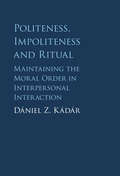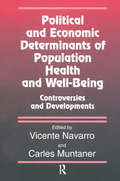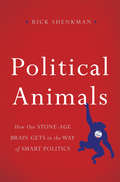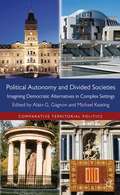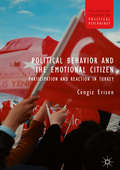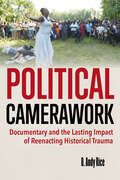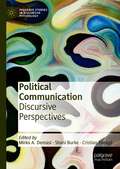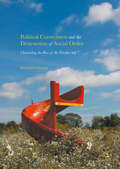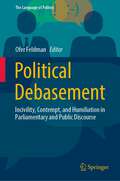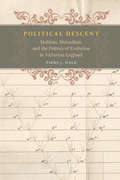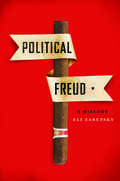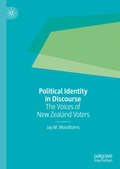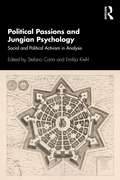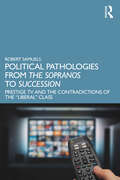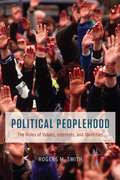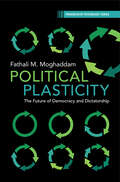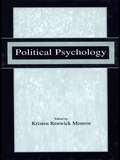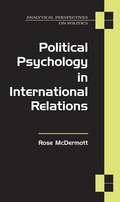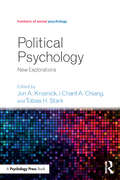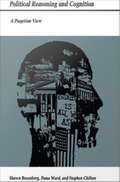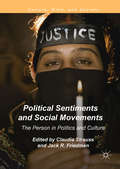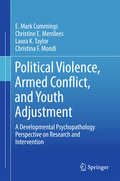- Table View
- List View
Politeness, Impoliteness and Ritual Maintaining the Moral Order in Interpersonal Interaction.
by Dániel Z. KádárRitual is popularly associated with ceremonies, though in real life it plays a significantly more important role, reinforcing what people perceive as the appropriate moral order of things, or challenging what they perceive as the inappropriate flow of events. This book introduces the reader to how people use ritual in interpersonal interaction and the interface that exists between ritual and politeness and impoliteness. As rituals have a large impact on the life of people and communities, the way in which they use politeness and impoliteness in a ritual action significantly influences the way in which the given ritual is perceived. Politeness, Impoliteness and Ritual examines this complex relationship by setting up a multi-layered analytic model, with a multidisciplinary approach which will appeal to interaction scholars, politeness researchers, social psychologists and anthropologists, and moral psychologists. It fills an important knowledge gap and provides the first (im)politeness-focused interactional model of ritual. Provides a model that can be used to analyse a wide variety of data types Provides a multidisciplinary approach to (im)politeness and ritual, by utilising politeness research, pragmatics, cross-cultural and historical interaction research, and social psychology Provides an in-depth framework of social aggression, including phenomena that generate public attention such as bystander intervention Utilises both metapragmatic and discourse analytic research
Political And Economic Determinants of Population Health and Well-Being: Controversies and Developments (Policy, Politics, Health and Medicine Series)
by Vicente Navarro and Carles MuntanerThe field of social inequalities in health continues its vigorous growth in the early years of the 21st century. This volume, following in the footsteps of Vicente Navarro's edited collection The Political Economy of Social Inequalities, is a compilation of recent contributions to the areas of social epidemiology, health disparities, health economics, and health services research. The overarching theme is to describe and explain the evergrowing health inequalities across social class, race, and gender, as well as neighborhood, city, region, country, and continent. The approach of this book is distinctly multi-, trans-, and interdisciplinary: the fields of public health, population health, epidemiology, economics, sociology, political science, philosophy, medicine, and history are all represented here.
Political Animals: How Our Stone-age Brain Gets In The Way Of Smart Politics
by Rick ShenkmanCan a football game affect the outcome of an election? What about shark attacks? Or a drought? In a rational world the answer, of course, would be no. But as bestselling historian Rick Shenkman shows in Political Animals, our world is anything but rational. This isn’t because we aren’t smart. Instead, modern cues are setting off ancient, instinctive responses that worked to keep us safe in the Stone Age but lead us astray today. Pop culture tells us we can trust our instincts. But science is demonstrating that when it comes to politics, our Stone Age brains can malfunction and misfire. Fortunately, we can learn to override our instincts and ensure that they work in our favor. Drawing on science, politics, and history, Shenkman explores the hidden reasons behind our political choices and uncovers the invisible forces that are truly responsible for victory or defeat at the ballot box.
Political Autonomy and Divided Societies
by Michael Keating Alain-G. GagnonAn all star cast of academic experts offer an important and timely analysis of the pursuit of autonomy. They argue that it is key to move beyond the primarily normative debate about the rights or wrongs of autonomous regions on the basis of cultural concerns, instead focusing on understanding what makes autonomy function successfully.
Political Behavior and the Emotional Citizen
by Cengiz ErisenThis book studies the role of emotions, such as anger, anxiety, and enthusiasm, across various domains of political behavior in Turkey. The author considers how emotions affect evaluations of leadership performance, levels of intolerance, likelihood of following and participating in politics, perceived threats from terrorism, and electoral decisions, including vote choice. Using a nationally representative survey and experimental data, this study empirically analyses the causal associations among the primary factors explaining the Turkish electorate's political attitudes and behaviours. The book will be of particular interest to academics, university students, and policymakers seeking to learn more about contemporary Turkish politics amid the recent political and social turmoil that has affected all parts of this society.
Political Camerawork: Documentary and the Lasting Impact of Reenacting Historical Trauma
by D. Andy RiceWhat mental and physical distress do actors, camerapersons, and reporters experience when working on reenactments of traumatic moments in history? In Political Camerawork, D. Andy Rice theorizes that the intense feelings produced while creating these performed scenarios, called "simulation documentaries," connect difficult pasts to the present. Building on his background as a nonfiction film director, producer, editor, and cinematographer, Rice analyzes performance techniques to gain insight into the emotional toll of simulation documentaries, including those reliving the Vietnam War, the US military's embodied training in California during the Iraq War, and an annual quadruple lynching reenactment organized by Black civil rights activists in Georgia.Investigating the lasting impact of these productions, Political Camerawork reveals that, by performing a simulation of a traumatic event they didn't directly experience, those involved become carriers of the trauma.
Political Communication: Discursive Perspectives (Palgrave Studies in Discursive Psychology)
by Cristian Tileagă Mirko A. Demasi Shani BurkeThis book explores discursive psychological empirical research in the context of political communication. Drawing together a well-established field of study and a variety of discursive psychology approaches the authors confront the theoretical and practical challenges that discursive psychology and political communication studies face today. Using a diverse range of approaches, including the analysis of TV shows, cartoons, social media groups and blogs, face-to-face verbal interaction, political rhetoric and mainstream news reports, the authors explain the ways in which discursive psychology can offer insight into the nature of contemporary political communications. The book offers timely and international reflections on the context of online political communication, Brexit rhetoric, prejudice discourse and political persuasion, showcasing the analytical acumen and empirical insight that can be gleaned from discursive psychology methods.Political Communication: Discursive Perspectives highlights the value of contributions from outside English speaking academia and is essential reading for academics, researchers and students interested in political communication or discursive psychology.
Political Correctness and the Destruction of Social Order
by Howard S. SchwartzThis book develops a psychoanalytic theory of political correctness and the pristine self, which is defined as a self touched by nothing but love. It explores the damage that political correctness can do to social order. Applications include the breakdown of social capital, the financial crisis, and Occupy Wall Street. Long an issue for conservatives, alarm over political correctness has now spread to the liberal side of the political spectrum. As Schwartz argues, all have reason to be concerned. The psychology that underlies political correctness has the potential to be extremely destructive to social organization on every level. Schwartz discusses the primitive roots of political correctness and, through the use of case studies, shows its capacity for ruination. The book focuses on a transformation in the idea of the self, and specifically the rise of the pristine self. The problem is that, in truth, the world does not love us. This puts the pristine self at war with objective reality.
Political Debasement: Incivility, Contempt, and Humiliation in Parliamentary and Public Discourse (The Language of Politics)
by Ofer FeldmanThis edited book is an innovative collection of studies—pioneering scholarship systematically exploring the various features of debasement language used by political leaders in their speeches, statements, and remarks during parliamentary and other official as well as unofficial, private activities. The book examines in particular the forms, functions, and effects of political debasement in Western and non-Western countries, including Spain, Malaysia, the UK, Japan, China, India, Montenegro, Greece, Poland, and Israel. It addresses the growing interest in recent years in issues related to the increase of debasement in the public sphere. These include high-echelon politicians’ invective and vulgarity toward their colleagues in houses of parliament; their abusive and cynical language toward sections of the public, including women and minorities; and their crude sarcasm and irony expressed toward media representatives. The book focuses on those instances where political leaders at the very highest-level employ debasement discourse; it identifies the specific language they use in different political cultures and under different situations; the reasons for using this type of language; and its consequences. The book brings together a team of distinguished political scientists, communication and linguistics researchers, and social and political psychologists, with expert backgrounds and experience in understanding the reciprocal interaction between language and politics, in this case: debasement. They discuss and provide a number of novel insights of theoretical and practical importance regarding debasing discourse, as well as potential avenues for future research on the nature and effect of this type of language.
Political Descent: Malthus, Mutualism, and the Politics of Evolution in Victorian England
by Piers J. HaleHistorians of science have long noted the influence of the nineteenth-century political economist Thomas Robert Malthus on Charles Darwin. In a bold move, Piers J. Hale contends that this focus on Malthus and his effect on Darwin’s evolutionary thought neglects a strong anti-Malthusian tradition in English intellectual life, one that not only predated the 1859 publication of the Origin of Species but also persisted throughout the Victorian period until World War I. Political Descent reveals that two evolutionary and political traditions developed in England in the wake of the 1832 Reform Act: one Malthusian, the other decidedly anti-Malthusian and owing much to the ideas of the French naturalist Jean Baptiste Lamarck. These two traditions, Hale shows, developed in a context of mutual hostility, debate, and refutation. Participants disagreed not only about evolutionary processes but also on broader questions regarding the kind of creature our evolution had made us and in what kind of society we ought therefore to live. Significantly, and in spite of Darwin’s acknowledgement that natural selection was "the doctrine of Malthus, applied to the whole animal and vegetable kingdoms,” both sides of the debate claimed to be the more correctly "Darwinian. ” By exploring the full spectrum of scientific and political issues at stake, Political Descent offers a novel approach to the relationship between evolution and political thought in the Victorian and Edwardian eras.
Political Emotions
by Martha C. NussbaumHow can we achieve and sustain a "decent" liberal society, one that aspires to justice and equal opportunity for all and inspires individuals to sacrifice for the common good? In this book, a continuation of her explorations of emotions and the nature of social justice, Martha Nussbaum makes the case for love. Amid the fears, resentments, and competitive concerns that are endemic even to good societies, public emotions rooted in love--in intense attachments to things outside our control--can foster commitment to shared goals and keep at bay the forces of disgust and envy. Great democratic leaders, including Abraham Lincoln, Mohandas Gandhi, and Martin Luther King Jr. , have understood the importance of cultivating emotions. But people attached to liberalism sometimes assume that a theory of public sentiments would run afoul of commitments to freedom and autonomy. Calling into question this perspective, Nussbaum investigates historical proposals for a public "civil religion" or "religion of humanity" by Jean-Jacques Rousseau, Auguste Comte, John Stuart Mill, and Rabindranath Tagore. She offers an account of how a decent society can use resources inherent in human psychology, while limiting the damage done by the darker side of our personalities. And finally she explores the cultivation of emotions that support justice in examples drawn from literature, song, political rhetoric, festivals, memorials, and even the design of public parks. "Love is what gives respect for humanity its life," Nussbaum writes, "making it more than a shell. " Political Emotions is a challenging and ambitious contribution to political philosophy.
Political Freud: A History
by Eli ZaretskyIn this masterful history, Eli Zaretsky reveals the power of Freudian thought to illuminate the great political conflicts of the twentieth century. Developing an original concept of "political Freudianism," he shows how twentieth-century radicals, activists, and intellectuals used psychoanalytic ideas to probe consumer capitalism, racial violence, anti-Semitism, and patriarchy. He also underscores the continuing influence and critical potential of those ideas in the transformed landscape of the present. Zaretsky's conception of political Freudianism unites the two overarching themes of the last century—totalitarianism and consumerism—in a single framework. He finds that theories of mass psychology and the unconscious were central to the study of fascism and the Holocaust; to African American radical thought, particularly the struggle to overcome the legacy of slavery; to the rebellions of the 1960s; and to the feminism and gay liberation movements of the 1970s. Nor did the influence of political Freud end when the era of Freud bashing began. Rather, Zaretsky proves that political Freudianism is alive today in cultural studies, the study of memory, theories of trauma, postcolonial thought, film, media and computer studies, evolutionary theory and even economics.
Political Identity in Discourse: The Voices of New Zealand Voters
by Jay M. WoodhamsThis book takes an innovative view of language and politics, charting the terrain of political identities and discourses in New Zealand through detailed linguistic analysis of interactions with its voters. The author first sets out the geographical and sociopolitical context, examining how the constraints of a small and isolated country interact with widespread social values such as egalitarianism. He then delves into the multiple nature of identities and explores how Kiwis form their political selves through informal talk with others and in engagement with their physical and discursive surroundings. In doing so, the author provides an in-depth exploration of New Zealand political culture, identity and discourse, and sheds light on how we use language to become political people. This book will be of interest to linguists, political scientists and sociologists working with discourse analysis.
Political Passions and Jungian Psychology: Social and Political Activism in Analysis
by Stefano Carta; and Emilija KiehlIn this book, a multidisciplinary and international selection of Jungian clinicians and academics discuss some of the most compelling issues in contemporary politics. Presented in five parts, each chapter offers an in-depth and timely discussion on themes including migration, climate change, walls and boundaries, future developments, and the psyche. Taken together, the book presents an account of current thinking in their psychotherapeutic community as well as the role of practitioners in working with the results of racism, forced relocation, colonialism, and ecological damage. Ultimately, this book encourages analysts, scholars, psychotherapists, sociologists, and students to actively engage in shaping current and future political, socio-economic, and cultural developments in this increasingly complex and challenging time.
Political Pathologies from The Sopranos to Succession: Prestige TV and the Contradictions of the “Liberal” Class
by Robert SamuelsPolitical Pathologies from The Sopranos to Succession argues that highly praised prestige TV shows reveal the underlying fantasies and contradictions of uppermiddle-class political centrists. Through a psychoanalytic interpretation of The Sopranos, Breaking Bad, The Wire, House of Cards, Dexter, Game of Thrones, and Succession, Robert Samuels uncovers how moderate “liberals” have helped to produce and maintain the libertarian Right. Samuels’ analysis explores the difference between contemporary centrists and the foundations of liberal democracy, exposing the myth of the “liberal media” and considers the consequences of these celebrated series, including the undermining of trust in modern liberal democratic institutions. Political Pathologies from The Sopranos to Succession contributes to a greater understanding of the ways media and political ideology can circulate on a global level through the psychopathology of class consciousness. This book will be of great interest to academics and scholars considering intersections of psychoanalytic studies, television studies, and politics.
Political Peoplehood: The Roles of Values, Interests, and Identities
by Rogers M. SmithFor more than three decades, Rogers M. Smith has been one of the leading scholars of the role of ideas in American politics, policies, and history. Over time, he has developed the concept of "political peoples," a category that is much broader and more fluid than legal citizenship, enabling Smith to offer rich new analyses of political communities, governing institutions, public policies, and moral debates. This book gathers Smith's most important writings on peoplehood to build a coherent theoretical and historical account of what peoplehood has meant in American political life, informed by frequent comparisons to other political societies. From the revolutionary-era adoption of individual rights rhetoric to today's battles over the place of immigrants in a rapidly diversifying American society, Smith shows how modern America's growing embrace of overlapping identities is in tension with the providentialism and exceptionalism that continue to make up so much of what many believe it means to be an American. A major work that brings a lifetime of thought to bear on questions that are as urgent now as they have ever been, Political Peoplehood will be essential reading for social scientists, political philosophers, policy analysts, and historians alike.
Political Plasticity: The Future of Democracy and Dictatorship (Progressive Psychology)
by Fathali M. MoghaddamPolitical plasticity refers to limitations on how fast, how much, and in what ways political behavior does (or does not) change. In a number of important areas of behavior, such as leader-follower relations, ethnicity, religion, and the rich-poor divide, there has been long-term continuity of human behavior. These continuities are little impacted by factors assumed to bring about change such as electronic technologies, major wars, globalization, and revolutions. In addition to such areas of low political plasticity, areas of high political plasticity are considered. For example, women in education is discussed to illustrate how rapid societal change can be achieved. This book explains the psychological and social mechanisms that limit political plasticity, and shape the possibility of changes in both democratic and dictatorial countries. Students, teachers, and anyone interested in political behavior and social psychology will benefit from this volume.
Political Psychology
by Cristian TileagThis book provides an introduction to political psychology through a focus on European politics and topics. It describes a style of doing political psychology in Europe that has developed out of dialogue with as well as critique of North American approaches. By emphasising the theoretical and methodological diversity of political psychology, the book is intended to contribute to a greater understanding of the strength and utility of the field. - Opens up and extends the study of political psychology to a variety of socio-political contexts and manifestations of political behaviour - Clearly outlines the usefulness and promises of distinctive critical approaches in social and political psychology - Explicitly considers the role of language, communication, identity and social representations in the construction of political meanings. Political Psychology will appeal to upper-level students and scholars who seek to extend their knowledge of the complex relationship between psychology, politics and society.
Political Psychology
by Kristen Renwick MonroeWith a list of contributors that reads like a "Who's Who" of political psychology, this comprehensive volume introduces the major concepts, debates, and themes in the field and provides an overview of its intellectual development, its disparate parts, the major controversies and some suggestions for the future direction of the field.
Political Psychology in International Relations
by Rose McdermottA comprehensive account of the field of political psychology with a focus on its implications for international relations
Political Psychology: New Explorations (Frontiers of Social Psychology)
by Jon A. Krosnick, I-Chant A. Chiang, and Tobias H. StarkIn recent decades, research in political psychology has illuminated the psychological processes underlying important political action, both by ordinary citizens and by political leaders. As the world has become increasingly engaged in thinking about politics, this volume reflects exciting new work by political psychologists to understand the psychological processes underlying Americans’ political thinking and action. In 13 chapters, world-class scholars present new in-depth work exploring public opinion, social movements, attitudes toward affirmative action, the behavior of political leaders, the impact of the 9/11 attacks, and scientists’ statements about global warming and gasoline prices. Also included are studies of attitude strength that compare the causes and consequences of various strength-related constructs. This volume will appeal to a wide range of researchers and students in political psychology and political science, and may be used as a text in upper-level courses requiring a scholarly and contemporary review of major issues in the field.
Political Realism, Freud, and Human Nature in International Relations
by Robert SchuettIn the tradition of political realism, this book provides an important reappraisal of the concept of human nature in contemporary realist international-political theory. With special reference to the anthropology of Sigmund Freud, a consequential yet terribly neglected and underestimated thinker in International Relations, Schuett demonstrates that analytical and normative theorizing of all international-political reality, its nature, tragedies, and potentialities, requires a sophisticated theory of human nature. Developing a Freudian philosophical anthropology for political realism, he argues for the careful resurrection of the concept of human nature in the wider study of international relations.
Political Reasoning and Cognition
by Shawn W. Rosenberg Dana Ward Stephen ChiltonThis work presents a new, alternative approach to studying the formation of political ideologies and attitudes, addressing a concern in political science that research in this area is at a crossroads. The authors provide an epistemologically grounded critique on the literature of belief systems, explaining why traditional approaches have reached the limits of usefulness. Following the lead of such continental theorists such as Jurgen Habermas and Anthony Giddens, who stress the importance of Jean Piaget to the development of a strong theoretical perspective in political psychology, the authors develop a different epistemology, theory,and research strategy based on Piaget, then apply it in two emperical studies of belief systems, and finally present a third theoretical study of political culture and political development.
Political Sentiments and Social Movements: The Person In Politics And Culture (Culture, Mind, And Society Ser.)
by Claudia Strauss Jack R. FriedmanThis unique volume is about how ordinary people construct political meanings, form political emotions and identities, and become involved in or disengaged from political contests. Drawing on psychological anthropology, it illustrates the complexities of political subjectivities through engaging personal stories that complicate our understanding of the relationship between culture and politics. Chapters examine the Tea Party and Occupy Wall Street in the United States, third gender activism in India, Rastafari in Jamaica, Courage to Refuse in Israel, the environmental movement in the U.S., Salafi movements in northern Nigeria, post-socialist labor politics in Romania, and anti-immigrant activism in Denmark.
Political Violence, Armed Conflict, and Youth Adjustment
by E. Mark Cummings Christine E. Merrilees Laura K. Taylor Christina F. MondiThis book reviews and critiques the growing literature on youth development under conditions of political violence and armed conflict. It presents a robust framework, based in developmental psychopathology, for evaluating current research on this topic for strength of design, methodology, and documentation. Cross-sectional and longitudinal studies from diverse regions and conflicts as well as across disciplines examine risks and challenges as well as resilience and coping as youth develop in unstable and threatening environments. In addition, this book provides strategies for designing and implementing prevention and intervention programs as well as further opportunities for expanding applied research for youth exposed to political violence and armed conflict. Topics featured in this book include: Analysis of major research on youths' normative and pathological development during political violence and war. Guidelines for assessing research studies on the impact of political violence and armed conflict on youth. The effects of social ecology factors (e. g. , family, school, and community) on youth functioning. Post-traumatic stress disorder. Trauma-Focused Cognitive-Behavioral Therapy. Political Violence, Armed Conflict, and Youth Adjustment is a must-have resource for researchers, professors, clinicians/professionals, and graduate students in the fields of child and school psychology, family studies, and public health as well as developmental psychology, child and adolescent psychiatry, political science, anthropology, social and peace psychology, sociology, and ethnic studies.
